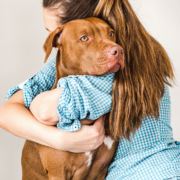National Pet Day: Understanding Pet Custody Laws in Illinois
Navigating pet custody during divorce can be intricate, especially when our beloved pets are deeply intertwined with our family dynamics. As we celebrate National Pet Day on April 11th, it serves as a poignant reminder of the unique connection we share with our furry friends. Nevertheless, divorce often stirs intense emotions, further complicating an already delicate circumstance.
As attitudes toward pets evolve, so do the laws governing their custody in divorce cases. In Illinois, courts recognize the profound significance of pets in family life and consider their well-being when determining custody arrangements. Navigating these legal intricacies can be daunting, which is why seeking the guidance of a compassionate divorce attorney can be essential.
Join us as we explore the evolving landscape of pet custody in Illinois and how a divorce attorney can be crucial for protecting the best interests of your beloved furry companions.
THE CHANGING LANDSCAPE OF PET CUSTODY
Traditionally, pets were treated as personal property in divorce proceedings, subject to division, and other assets such as cars and furniture. However, many pet owners found this approach inadequate, as it needed to consider the emotional bond between humans and their animal companions.
71% of domestic violence victims reported that their abuser also targeted pets. In one study of families under investigation for suspected child abuse, researchers found that pet abuse had occurred in 88% of the families under supervision for physical abuse of their children.
Recognizing this, several states, including Illinois, have adopted laws that allow courts to consider the pet’s best interests when determining pet custody arrangements. While pets are still technically considered property under the law, judges now have the discretion to award custody based on factors such as who primarily cares for the pet, who can provide a stable living environment, and the relationship between the pet and each spouse.
UNDERSTANDING PET CUSTODY IN ILLINOIS
Pet custody is a significant consideration in Illinois divorce cases. When spouses cannot agree, the court decides based on various factors. Unlike parental responsibilities, no strict guidelines lead to varied outcomes. Disputes over pets like dogs and cats are common in divorces.
The Illinois Marriage and Dissolution of Marriage Act addresses custody-like provisions for family pets, also known as ‘companion animals.’ These pets are treated as marital assets. However, it’s essential to note that not all pets fall under this category. The specific provisions may not cover pets such as reptiles, birds, or small mammals for companion animals. Ownership may be determined based on general property division principles rather than considering the pet’s well-being.
Factors determining pet ownership include:
- Who adopted the pet.
- Day-to-day caregiving.
- Each spouse’s ability to care for the pet.
- Any emotional attachments to the pet.
- Any ownership agreements for the pet.
The owner retains sole ownership if the court deems the pet a non-marital asset. If it’s a marital asset, ownership is allocated based on the pet’s well-being. It’s important to note that while courts may consider the pet’s best interests, their primary concern is still the parties’ welfare. Fortunately, Illinois law recognizes that pets hold a special place in families and takes their well-being seriously when determining ownership during divorce proceedings.
HOW DOES THE COURT CONSIDER THE “WELL-BEING” OF THE PET?
It’s worth noting that, unlike the allocation of parental responsibilities, pet custody in Illinois is not based on the pet’s “best interests.” Suppose one spouse can demonstrate that they have been mainly responsible for the daily care and well-being of the pet, including feeding, grooming, and providing medical care. In that case, the court is more likely to award ownership to that spouse.
If you want to retain ownership of your pet after a divorce, it’s important to have evidence that shows your involvement in the pet’s life. This can include photographs and receipts for pet-related expenses such as veterinary bills. These documents show the court your commitment to caring for the pet and the bond you share with them.
It’s important to note that courts may consider parental responsibilities and parenting time when determining pet ownership during a divorce. Children often share a strong bond with family pets, and a spouse can argue that most parenting time could be affected. If spouses can’t agree on pet ownership, they may need to go to court to have a judge decide. Couples can mediate pet disputes when a divorce case doesn’t go to court. Regardless of the approach chosen, finding a solution that suits one’s specific circumstances is critical.
HOW A DIVORCE ATTORNEY CAN HELP
Navigating pet custody issues in divorce cases can be emotionally charged and legally complex. A divorce attorney can provide valuable assistance in protecting your pet’s rights. At Masters Law Group, you can confidently navigate the complexities of divorce and reduce stress. Your rights and the well-being of your family are our top priorities. Here are some ways our divorce attorneys can help:
- Negotiation and Mediation: Pet custody disputes can be resolved through negotiation or mediation outside of court. Your attorney can help advocate during these discussions to reach a mutually acceptable agreement that prioritizes your pet’s well-being.
- Court Representation: A skilled attorney is essential if negotiations fail and your case proceeds to court. Your attorney will present evidence and arguments to support your position, helping increase your chances of a favorable outcome in the judge’s eyes.
- Gathering Evidence: Your divorce attorney can assist you in gathering evidence to support your claim to pet ownership. This may include documentation of your involvement in the pet’s care, such as veterinary records, receipts for pet-related expenses, and witness statements attesting to your relationship with the pet.
- Addressing Parenting Time Concerns: If children are involved, a divorce attorney can help address concerns about how pet custody arrangements may impact parenting time. They can work to find solutions that prioritize both the children’s and the pet’s well-being.
- Emotional Support: A divorce involving pet custody can be emotionally challenging. Your attorney can provide compassionate support and guidance throughout the process, helping you navigate the difficult decisions and emotions.
FINAL THOUGHTS
Pets are uniquely positioned in divorce proceedings, representing shared property and emotional connections between spouses. Navigating the complexities of determining their custody and care can be challenging and emotionally charged. That’s why it’s crucial to have strong legal representation to assert your rights regarding pet ownership in an Illinois divorce.
If you’re contemplating divorce, mediation, or separation and have concerns regarding your pets, our attorneys are here to help. Contact us today to set up your complimentary consultation.











